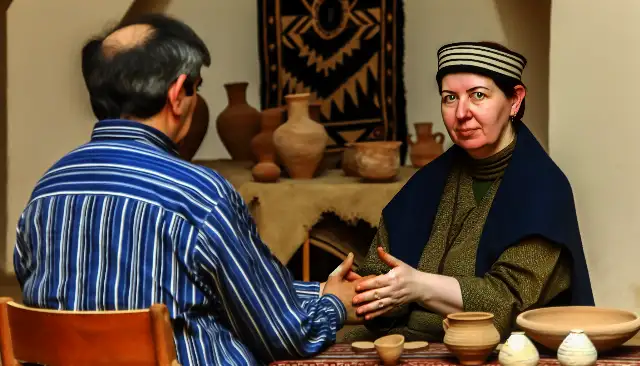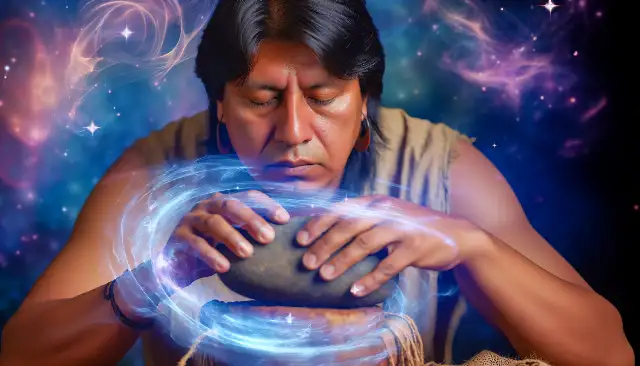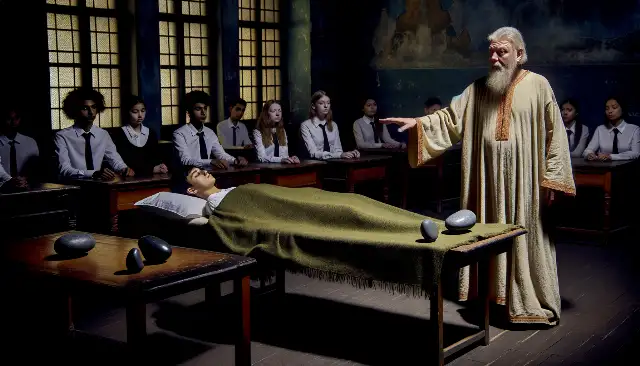
"Do you think they'll be back soon?"
The little boy asked his question while watching the old battered truck pull out of the field and on to the gravel road.
"Soon enough, I suppose. Don't worry, we won't be here after dark."
The little boy turned and looked at the old man. Not so old, really, maybe fifty-six; but to the little boy, anyone over the age of ten had attained the title of old age. Already at the age of six he had become used to the old man giving voice to his own unspoken fears. Nothing seemed odd to him about that. Normal people did that all time, as far as he knew. He turned and surveyed the situation. Forty acres of bottomland, half plowed, the old International tractor sat slumped at the end of freshly plowed row, one tire missing. The axle stuck out, he thought, like a broken leg with no foot.
"I don't know about you, but I don't think I'll stand here and let the sun bake my brains out until they get back. Let's move over by the fence row. I think there's a little shade there," the old man said as he turned and started slowly walking to the other side of the field.
Turning back to look at the road, all that was left now was the billowing cloud of gravel dust settling down across the upper part of the field. Beyond that, there was only mountain. The little boy wasn't happy about this turn of events. There was nothing to do here if the tractor wasn't busy snorting and jiggling through the rich loamy silt of the bottom land. He liked to ride sitting on the fender and watch as the plow rolled back the dark brown earth like the pages of a book. He turned just as the old man looked back at him.
"You'd better come on," he said, "Your mother would have a fit on me if I let you get burned up out in the sun."
This occupied the boy's mind for a moment before he began plodding through the soft dirt towards the fencerow. He had never actually seen his mother have a 'fit' - at least, not that he was aware of, and he wasn't sure that might not be something interesting to see. But, he decided as he reached the fence where the old man was standing filling his pipe, that a "fit" was probably something that would end up getting blamed on him. It was probably best to wait until someone else caused her to have a fit - then he could just observe out of the line of fire, so to speak. By the time he reached the fence row, he was sweating in streams from under the old army cap he was wearing. He wiped the sweat from his face with the back of his hand.
The old man pulled his bandanna from his back pocket. Handing to the boy, he said, "you should always carry one of these, just stick it in your back pocket, then you'll always have something to wipe the sweat off."
The little boy dutifully scrubbed his face with the bandanna as though he were using a washcloth.
"Leave a little hide so people will still recognize you," the old man said with a grin in his voice.
Handing back the bandanna, the little boy turned and sat down on an old log rolled tight up against the fence posts. Looking up at the limbs and leaves of the tree, he asked the old man what kind it was.
"It's a water Birch," the old man said matter of factly, "they like growing near creeks and rivers where there's plenty of water." He then turned his gaze towards the creek running along side the field which every spring deposited its load of silt by spreading out over the bottom during heavy spring rain, and then retreated again in the face of dryer summer weather. Looking at the creek, the little boy thought how it reminded him of a fat green snake. It was moving very slowly, as though it too was hunting for shade from the heat of an afternoon sun.
Noticing the movement of the tiny leaves of the birch limb hanging in front of him, the little boy soon felt the breeze coming across the open fields. Any breeze felt good in the heat and momentarily carried away the wet, sweet smell of fresh earth from the plowing. The old man lit his pipe in quick small puffs from the match he had struck and watched the smoke drift away in the breeze.
"Looks as though the gods have smiled on us and sent a little breeze to cool us down," he said.
Thinking about the concept in those words, the little boy reflected back on his life in the other world. That's how he had started thinking about the difference between life here and the place he lived and went to school in the city, as though they really were two different worlds. The previous fall, in a fit of piety, his mother had joined the local Baptist church near where they lived and enrolled him in Sunday school classes. Not sharing in his mother's sudden interest in eternal salvation, the little boy had objected strenuously at first to facing yet another day in the week requiring him to get up early. He wasn't quite sure about school yet, and adding Sunday to the list of days that you couldn't sleep late seemed punishing. That seemed to be a big theme with the Sunday school teachers too - it seemed like God was out to punish little boys for just about everything. He wasn't sure what he had done, but he was possessed with a growing unease that no matter what he did or thought, even with the best motivations, God wasn't going to like it very much. The idea there might be Gods, in a plural sense, made the prospect of finding eternal salvation, something his Sunday school teachers seemed very earnest about, almost impossible. If you couldn't seem to ever please one God, how could you ever hope satisfy more than one?
"How can there be more than one God?" The question just sort of tumbled out of his mouth as the result of his thinking process.
The old man, who had been slowly puffing on his pipe and looking off into the distance, turned to him and said, "Oh, that's right, you're mother told me she had started back to church and that you were going with her. She's very proud of you. How do you like it so far?"
The question fell flat; there was no emotion or expectation in the way it was asked. The little boy had started getting used to seeing the answer people expected from the way their questions felt, but the old man never gave him that opportunity. He made him walk on his own ground for the answers.
"Well, it's okay, I guess," the little boy hesitated to see if the old man would give him a hook for the answer he was really expecting. "I have to get up early, though."
"Some people like to pray early, I suppose, get a head start on the rest of the sinners, sort of like being first in line for something," the old man was smiling now. "But what does 'okay' mean - does it make you happy and that's okay, or people are mean to you, but you're okay with that?"
"No, nobody is mean to me", the little boy was surprised at the question, but he still had no place to answer in a way that gained approval. He ran through his mind and came up with a question of his own; perhaps that would give him a clue where the conversation should go.
"My mom says you don't go to church and you should, why not?"
"Maybe I don't like to get up that early either," the old man laughed at this, a deep rumbling laugh that came out like small soft waves.
He was always up, it seemed to the little boy, always there in the mornings at breakfast. In fact, the little boy wondered if he ever slept at all. He thought back about getting up in the night, calling for his mother and the trip down the darkened stairs to the bathroom. The old man would be sitting in his chair under the dim illumination of one small light, reading. Sometimes, when nightmares had chased sleep away, the little boy would sit in his lap, and the old man would read to him from his books. He would read softly in his deep bass voice, the energy of it rumbling through the little boy's body, connecting him with the words, the feelings in the story, until he became a part of the picture play it created in his head. He always woke up in his own bed, the stories still living in his head. He shifted around on his log seat and crossed his legs. The old man was looking off into the distance, pulling slowly on his pipe, the little curls of smoke drifting away in the breeze.
"So why don't you?"
"Why don't I what?" the old man asked.
"Go to church - why don't you go to church?"
The little boy felt his own voice rise a little, as though he were disgusted with having to repeat himself, which he really wasn't; he knew this was a little game they played. This time the old man surprised him, though, by not answering with another question; instead, he turned and looked at the boy and answered him directly.
"Preachers and I don't get along very well. They see things one way, I see them another. That's all there is to it." The old man delivered this statement very matter of factly. To the boy, there was no hint of emotion behind the words, simply a statement of fact. Thinking over the possible reasons for taking such a position in life, the little boy had to ask the first question any small child would have.
Looking earnestly at the old man, he asked, "Didn't you like your preacher? Was he mean to you?"
The old man was smiling now and looking directly at the little boy.
"No, they weren't mean to me any more than they're mean to you, and I have met more than one or two preachers in my time."
This statement was truly a puzzlement to the little boy, and he scrunched up his forehead to think, because that's what people do when something is a puzzlement. Still thinking, he asked again, "So if they weren't mean to you, why don't you go listen to them?" The old man turned more towards the boy perched beside him, and now his face took on a serious look, "Let me ask you a question for a change," the little boy nodded, "What do you see when you look at your preacher?"
The boy only thought for a moment. This was easy, he supposed, and answered.
"I see a man," he said, with a certain amount of six-year-old conviction.
"Yes, you see a man," the old man said quietly, "But what do you see in this man when you stand next to him, or watch him from your pew?"
Starting with the color of the man's hair, the little boy began to describe his preacher, but the old man stopped him in mid sentence. "No, I don't mean what does he look like physically. I'm sure he's a handsome fellow. What I mean is, what do you see, what do you feel, how does he make you feel when you are around him?"
More scrunching and general puzzlement followed on the boy's part as he gave this change in conversational course serious consideration. The old man turned and picked up their ancient water jug from the ground next to the log, and twisting seriously at the old bent lid, which served as a cup, waited and poured water into it while the boy thought.
"Here," he said, handing the cup over to the boy, "A man thinking that hard needs to wet his goozler or he'll get all dried out." He smiled as a twinkle played across his ice blue eyes. The boy was beginning to appreciate that twinkle as a sign of merriment. Taking the cup, the little boy drained the water down in big gulps, the taste of the old hot aluminum giving it a metallic bite as it slid down. Staring down into the now empty cup, the little boy suddenly connected to what the old man's question had really been seeking, what he was really asking him to reflect on when looking at anyone, not just the preacher. Between handing back the old cup and wiping his mouth with the back of his hand, the little boy found room for his answer.
"I guess, when I look at him, he scares me a little," he said, trying to be as matter of fact about an emotional reaction as the old man's original question had seemed to dictate.
Having sealed up the jug, the old man sat it back down, and without questioning how the boy could arrive at such a conclusion by just looking at someone so seemingly normal as a preacher, asked simply, "Why do you suppose that is, that he scares you a little, I mean."
More scrunching and puzzlement followed; this was getting to be too much for a six-year-old mind to cipher out. The old man wasn't smiling, but the little boy could tell there was a smile in there somewhere when the old man said, "You know, if you have to think this hard about everything in life, living is going to be pretty dull."
Giving up momentarily on the scrunching and general puzzlement, the little boy relaxed his thoughts long enough to uncross his legs which were beginning to feel a little too much like the rough bark of the log. That's when the answer hit him, almost it seemed as though it had come from somewhere else and just plopped down whole into his mind.
"I guess he scares me because he seems so mad all the time."
Nodding without any visible sign of expression, the old man said, "So even though he may act charitable and happy on the outside, somehow you still see the anger in him?"
Anger with happiness was a distinct conundrum to the little boy - how could to two things exist at the same time in someone, especially someone who was telling other people about God? He tried to wrap his mind around the paradox. How could it possibly be like that, and what did it mean? Finally, he gave in to the puzzlement with an audible sig. He had to admit his mind just wasn't big enough to take it in.
"I guess he's just mad about something. I don't really understand it."
The old man spoke softly, "It is a hard thing to understand, but then, people can be hard to understand when you try to make any real sense out of what they say and then what they do. I wouldn't worry about it too much. He's not angry with you.
"But why is he mad," the little boy said, "That's what I don't understand."
"Well, I've never really met one that wasn't angry, deep down, when you strip off the covering of humility and faith. He's mad because he's a man and he sees God as a man, and God is in the way". The old man continued, quietly, but with a firm even voice, explaining, "You see, now your preacher may be different, I'm sure he's a good man, but when you see God as some other feller off in the distance somewhere and you're telling people about him, after a while he starts to feel like people are listening to him, not to God, because God isn't there doing his own talking. Then he realizes that they are listening to him because of what he's saying God said, just being a messenger boy, and that makes him angry because there's no way to get away from it and have people still listen to him. He's caught and feels like he's the one doing the work, but God's getting all the credit. He thinks God is out there somewhere, so he can't make the adjustment, and he ends up just being mad."
Stopping, the old man stared off towards the far end of the field, but the little boy knew he wasn't looking at anything in particular there. His eyes were seeing something somewhere else, as though he was gone, but his body was still there. He seemed to return quietly and pulled his old briar pipe out of his pocket and searched for his little bag of Prince Albert. Finding it hiding in his front pants pocket, he pulled it out and snapped the old pipe against the log to dislodge its load of ash and began the familiar ritual of refilling it.
While this was going on, the little boy was thinking about what the old man had just said and whether it could be fit together somehow in his experience. It sort of made sense, it would certainly make sense from what he had observed, that underneath the compassionate exterior of their young minister there was a core of anger. He was mad about something, the boy was sure of that, but was this the explanation?
"I don't understand something," he said, without really looking up as the old man lit the pipe with one of the kitchen matches he always carried in with the tobacco. He thought about the concept and realized that he thought of God that way too, as some sort of being, off in the distance somewhere, who was watching him. His real concept was sort of vague, like a ghost in his mind that he wasn't quite sure how to give form to with the mind's eye.
"If God isn't out there somewhere, then where is he, and if he isn't a he, then what is God?"
The old man turned to him and smiled, "That's two questions."
"Okay, two questions then," the little boy said, some what contentiously. He didn't like to be corrected that way, "But I still don't understand."
"Well, your preacher sees himself as apart from God because he is alive here and now. He believes he has to stay in God's good graces in order to be with him, but only after he has kicked the bucket. If you add to that the fact that people never really believe they are going to die, except in sort of a drawn out mental sort of way, then he really doesn't feel he will ever be with God, not really, even though his mind tells him he will. So that leaves him open to all sorts of emotions that don't have much to do with his religion."
He puffed on his pipe slowly a couple of times, watching the smoke drift up and away in the soft breeze. Finally, he said, "Let me tell you a little story."
"A long time ago there were some people who had never heard of God. I know that's hard to believe, but I'm talking about way, way back, in olden times. But when they weren't fighting and scratching just to stay alive, they wondered about the bigger questions all people wonder about. Over the years they started looking for why they were there, why there was so much pain and sickness and misery. You know, people didn't live very long in those days, they didn't have hospitals or doctors and stores where they could buy groceries, which didn't really matter I suppose, since they didn't have any money, anyway. So, they looked around for the why of it all, why them, why here, why now?
Since no one had told them about Jesus and the disciples - couldn't really, since Jesus hadn't even been around yet - they looked in the only places they knew well enough to feel safe looking, themselves. What they found was a spark, and that spark was life itself, the will to exist."
"How did they find it?" the little boy asked. This sounded sort of like Roy Rogers trying to find the bad guy's hideout - he liked that show.
"Well, I said they were poor and struggling. I didn't say they were stupid."
"Oh," was all the little boy could think to say. He wasn't sure he understood again.
"Are you following the story?", the old man smiled.
"Yes."
"Well, we'll see," said the old man.
"Anyway, when they found that spark and what moved it, they started to look around them with this new understanding, sort of taking a second look at the world, now that they knew something more about themselves. You know what?"
"No, what."
"They found that same spark, but different, in everything they could see in the world."
"Really?"
"Yep, really. So what they figured out then was that if there was this spark in everything, only different, that maybe you could say that everything was alive because of it. And if you could say everything was alive because of it, then you really could understand and see how everything fit together. And if you could see that, then you could use your understanding to help the sick, fight off your enemies and make life better for your family."
"So if they could see all that," the little boy asked, "were they like, witches or something?" He had exhausted his knowledge of the supernatural with that question.
The old man gave out with a hearty laugh at that point, and when he stopped, he looked over at the boy and said, "No child, they weren't witches. The only thing the witches ever accomplished that I could see was getting themselves barbecued." He laughed again, but this time the little boy laughed with him - he knew it had been a silly question.
"I still don't understand what that has to do with God though."
"I'm not surprised," said the old man, "it's sort of a jump from here to there, but let me try to explain. Those people went on, having children, raising families, learning more and more about what they had figured out. Some went one way, some another, but they all carried with them that understanding about life and the world around them. Religions came and went. In those days, religion was sort of a convenience item, not something people worried a lot about unless it got in the way, or was to their advantage to use against someone else. Then one day, this new religion came along that said you either had to believe their way or they would kill you and your whole family."
"Why?" This fact chilled the little boy for some reason, even in this heat.
"Because they wanted their beliefs to be the only ones, and if you didn't agree, they would just kill you. Pretty soon they had converted a lot of people with that line of reasoning, since most people don't really care one way or the other, when you get right down to it. Some of those people who saw life so much differently tried to explain how they didn't really see a difference between the two, not in a realistic way anyway."
"Did they listen to them?"
"No, they killed them too. They weren't open to much scriptural interpretation in those days."
"Why, what were they doing that was so wrong?"
"Well, you see, as long as God was way off somewhere and the only way you could really get to him was to die, then you could pretty much do whatever you wanted with people and hope you could make it up before you died by asking for forgiveness."
This was starting to sound familiar to the boy now. He had heard a lot in Sunday school class about asking for forgiveness. But, he couldn't imagine Mrs. Hardesty chasing down people to kill them for not believing the way she did. For one thing, she was just too fat - the stairs up to the classrooms were challenging enough, it seemed.
"Do you see where I'm going with this?" the old man asked.
"I don't know," which was an honest answer on the little boy's part. He was lost with this story.
"Well, it boils down to this: those people who were looking so hard at themselves and the world around them understood the concept of God as a living thing, here, now. The new religion saw God as far off and as separate from people. The old people believed you could reach out and touch the face of God, anytime, anywhere, because it was a living face."
"What did those old people call God if they didn't know that name?" This was something that struck the little boy as needed information; you had to put names on things.
Suddenly the old man leaned over, elbow on knee and looked at the boy, he had an intensity in his eyes he hadn't really seen before, something so intense it felt like you were being poked with the gaze. The old man studied him for a moment, and the intensity passed. And suddenly, his eyes had that familiar twinkle back.
"Call it whatever you want. A name is just a word, a noise you make. The name isn't important right now."







You don`t have permission to comment here!
Terms & Conditions
Subscribe
Report
My comments